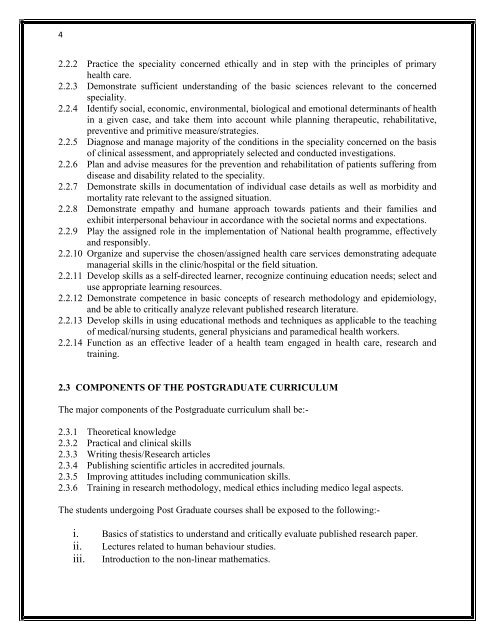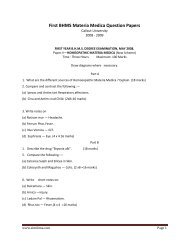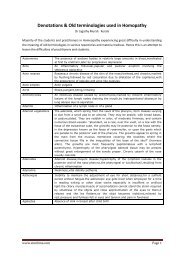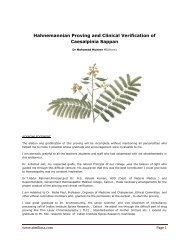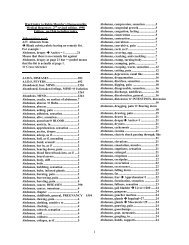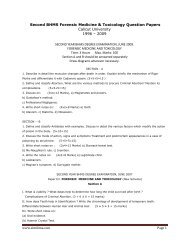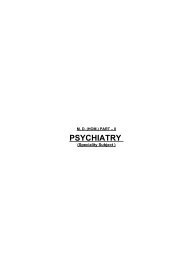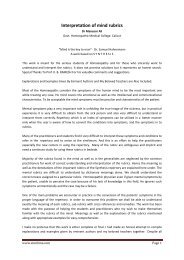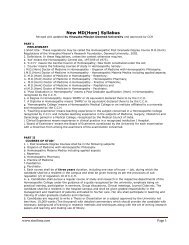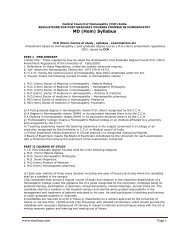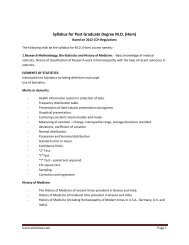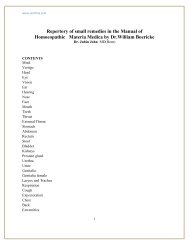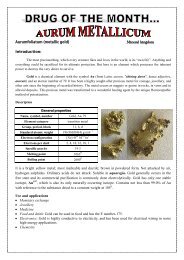KUHS – Kerala University of Health Sciences – MD (Hom - Similima
KUHS – Kerala University of Health Sciences – MD (Hom - Similima
KUHS – Kerala University of Health Sciences – MD (Hom - Similima
Create successful ePaper yourself
Turn your PDF publications into a flip-book with our unique Google optimized e-Paper software.
4<br />
2.2.2 Practice the speciality concerned ethically and in step with the principles <strong>of</strong> primary<br />
health care.<br />
2.2.3 Demonstrate sufficient understanding <strong>of</strong> the basic sciences relevant to the concerned<br />
speciality.<br />
2.2.4 Identify social, economic, environmental, biological and emotional determinants <strong>of</strong> health<br />
in a given case, and take them into account while planning therapeutic, rehabilitative,<br />
preventive and primitive measure/strategies.<br />
2.2.5 Diagnose and manage majority <strong>of</strong> the conditions in the speciality concerned on the basis<br />
<strong>of</strong> clinical assessment, and appropriately selected and conducted investigations.<br />
2.2.6 Plan and advise measures for the prevention and rehabilitation <strong>of</strong> patients suffering from<br />
disease and disability related to the speciality.<br />
2.2.7 Demonstrate skills in documentation <strong>of</strong> individual case details as well as morbidity and<br />
mortality rate relevant to the assigned situation.<br />
2.2.8 Demonstrate empathy and humane approach towards patients and their families and<br />
exhibit interpersonal behaviour in accordance with the societal norms and expectations.<br />
2.2.9 Play the assigned role in the implementation <strong>of</strong> National health programme, effectively<br />
and responsibly.<br />
2.2.10 Organize and supervise the chosen/assigned health care services demonstrating adequate<br />
managerial skills in the clinic/hospital or the field situation.<br />
2.2.11 Develop skills as a self-directed learner, recognize continuing education needs; select and<br />
use appropriate learning resources.<br />
2.2.12 Demonstrate competence in basic concepts <strong>of</strong> research methodology and epidemiology,<br />
and be able to critically analyze relevant published research literature.<br />
2.2.13 Develop skills in using educational methods and techniques as applicable to the teaching<br />
<strong>of</strong> medical/nursing students, general physicians and paramedical health workers.<br />
2.2.14 Function as an effective leader <strong>of</strong> a health team engaged in health care, research and<br />
training.<br />
2.3 COMPONENTS OF THE POSTGRADUATE CURRICULUM<br />
The major components <strong>of</strong> the Postgraduate curriculum shall be:-<br />
2.3.1 Theoretical knowledge<br />
2.3.2 Practical and clinical skills<br />
2.3.3 Writing thesis/Research articles<br />
2.3.4 Publishing scientific articles in accredited journals.<br />
2.3.5 Improving attitudes including communication skills.<br />
2.3.6 Training in research methodology, medical ethics including medico legal aspects.<br />
The students undergoing Post Graduate courses shall be exposed to the following:-<br />
i. Basics <strong>of</strong> statistics to understand and critically evaluate published research paper.<br />
ii. Lectures related to human behaviour studies.<br />
iii. Introduction to the non-linear mathematics.


